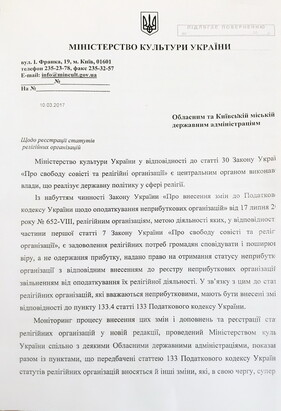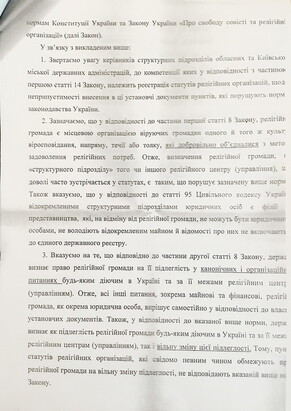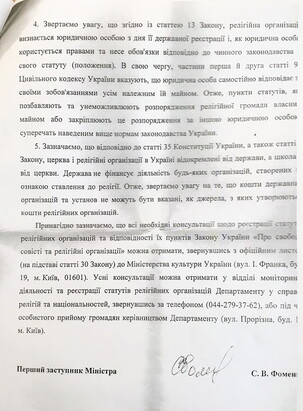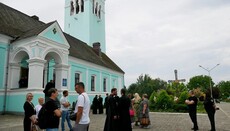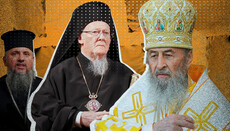Ministry of Culture against the UOC: a secret letter of civil servants
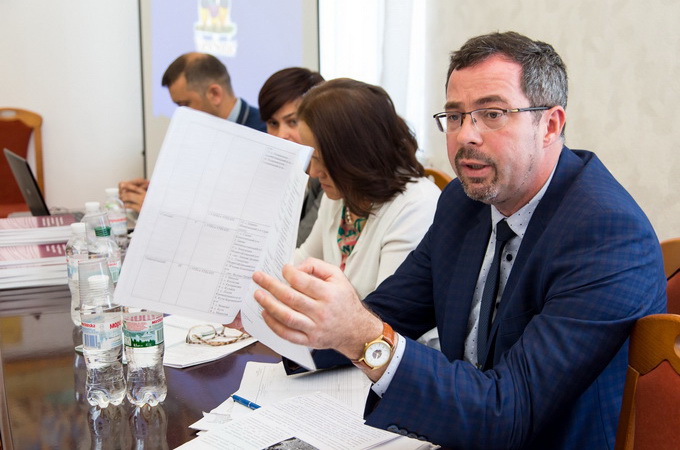
We requested Oleg Denisov, human rights defender, member of the Board of Directors of the International Human Rights Organization “Human Rights Advocacy” to comment on the text of the letter.
Efforts of the Ministry of Culture are directed at blocking the registration of the UOC statutes
The text has been tailor-made exceptionally for statutes of the Ukrainian Orthodox Church. It is illustrated, in particular, by allusions to the norm-related provisions of the statutes being common solely for Orthodox confessions.The letter does not contain reservations on prohibition of ungrounded denial of registration. It is calibrated right to refuse to register statutes and amendments thereto. Herewith reasons for such denial are not directly stipulated by the laws of Ukraine.
The letter has an overt target to block the registration of the UOC statutes, since historically these statutes contain paragraphs which became suddenly unacceptable to the Ministry of Culture.
Tax-free status is a cover for the Church persecution
Religious organizations are made to introduce amendments to the texts of their statutes purportedly for the sake of retaining their non-profit status. Isn’t it that necessary and expedient though?Religious organizations have never distributed profit among their members and to make them duplicate in their statutes the norms which can be easily established by the mandatory law is pointless from the juridical standpoint.
Just fancy: the state establishes a new tax. Why should one enshrine in statutes an obligation to pay taxes if it is a mandatory norm?
Therefore, a non-profit status of religious organizations could be enshrined without changing their statutes just by merely writing a respective norm in the Tax Code. Furthermore, such norms have de facto existed for long. It’s worth asking – why is the money of tax-payers wasted on absurd legislative initiatives like this one?
The answer is obvious – receiving a non-profit status is just a formal pretext to drop out the religious organizations that will be unable to accomplish the re-registration procedure.
What organizations will fail to do that? The answer is clear – only the communities, monasteries and parishes of the Ukrainian Orthodox Church, because they are compelled to make an unacceptable choice a priori – either to destroy their historically determined and entrenched canonical administrative structure or to lose a non-profit status.
Aim – to ruin a hierarchical structure of the UOC
Let’s take a look at the letter content in more detail. The letter provides guidelines on the cases when statutes of religious organizations have to be considered as inconsistent with the legislation of Ukraine.Firstly, according to the Ministry of Culture, religious organizations of the primary level, such as parishes cannot be called in statutes as “structural units of the religious confession.
However, such wording has been historically typical for the UOC statutes and used for decades. The Ministry referred to the non-compliance of this norm of the statute with Article 95 of the Civil Code of Ukraine having forgotten that new regulations of the Civil Law are irreversible and do not apply to religious organizations having been registered before this norm was adopted. Religious organizations are not bound to make corrections in their statutes every time when the Parliament of Ukraine amends one or another legal act.
An actual sense of such “recommendation” is to ruin a hierarchical structure of the UOC, to separate a community from the church center to make it easier for the Kiev Patriarchate to carry out its raiding actions.
Rebirth of Communist ideology
At the same time, the Ministry of Culture for some reason does not take into account the experience of Europe and western democratic world our country has been striving for. Other Orthodox Churches in the person of ruling archbishops are incapacity to use their church property to their own discretion and settle all related issues. Yet state authorities of democratic countries do not even try to raise an issue that such system violate the rights of communities.As regards a current administrative model within the UOC, it is de facto an implication of the coercive reform of the Communist rule set to delegate full power to the “Council of People’s Deputies” and – similarly – to the “Church Council”.
Pursuant to the Church canons, it is governed by a single hierarchical structure led by the Primate and diocesan bishops with a real and juridical subordination and obedience of parishes to his power. After the arrival of the Soviet regime an idea of splitting this vertical hierarchy was implemented by means of different schisms and setting up formally detached parishes having new administrative bodies – parish councils which were vested with a new scope of powers.
This is precisely the way pursued by the Ministry of Culture. However, the revival of Communist ideology by the Ministry of Culture looks quite bizarre in view of the pro-European course taken by Ukraine.
The Ministry of Culture distorts the notion of the community and its relationship with the diocesan center
Secondly, the letter states that the state allegedly recognizes the right of the religious community to its subordination to the religious center only in canonical and organizational matters (para 3 of the letter): "We point out that, in accordance with Part 2 of Article 8 of the Law, the state recognizes the right of the religious community on its subordination in canonical and organizational matters by any religious centers (administrations) operating in Ukraine and outside it. Thus, all other issues, in particular property and financial, the religious community, as a separate legal entity, decides independently in accordance with its own constituent documents."It is completely unclear why the letter concludes that property and financial issues are not organizational, and therefore on these issues the community must necessarily not obey the dioceses and other entities.
It is necessary to pay attention to the nature of this conclusion, since the meaning of this part of the letter of the Ministry consists precisely in the prohibition to the religious organizations of the UOC to formulate their statutes in such a way that on any issues the consent of the governing bodies of the diocese or central bodies of the UOC is required. Also, as we may assume, the Ministry will not agree with the possibility of introducing an additional quorum (the number of believers) in voting on the issue of changing the canonical subordination. After all, all the listed rules, according to the logic of the Ministry, can be considered as restrictions on the free transfer to another denomination.
However, the Statute on the management of the UOC, to which all the UOC communities without exception refer, contains the rules and norms adopted by all authority of the Church, which are binding for all parishes. Such norms concern a whole range of issues, including a quorum in the voting, the duties of the ruling bishop to sign each protocol of a parish meeting and bless the creation of the parish upon its primary registration.
One cannot but note the fact that many seizures of UOC churches that took place in 2015-2016 were covered with illegal documents that the community had expressed a desire to change jurisdiction, and the believers of the UOC, who opted to remain within the canonical Church, often used the existing wording in the statutes on the need to coordinate such decisions by the ruling bishop, including on property and financial matters, – to protect the interests of their parishes.
Therefore, the appearance of such a letter is a clear evidence of an attempt to weaken the legal protection system of the UOC by blocking the quite legitimate right of communities to protect themselves from attempts to raid their property by amending their statutes.
However, the Ministry does not hide its intentions, emphasizing in the third paragraph the purpose of the letter, namely, to ensure "a free change in the subordination of the community". The letter directly concludes that "the paragraphs of the statutes of religious organizations that deliberately in a certain way (what does this wording mean?– Ed.) restrict the right of the community to freely change subordination do not meet the law." At the same time, the Ministry does not specify what specific norms, in their opinion, can restrict this freedom.
The current legislation does not prohibit religious organizations from regulating the life of communities
Contrary to the opinion of the Ministry, the current legislation does not prohibit the formulation in the statutes of the provisions establishing the right to increase the quorum in the voting at parish meetings, to introduce a fixed membership or to provide the ruling bishop, the main sponsor, patron or ktitor with property and financial rights in respect of the parish.After all, the listed individuals who provided financial assistance to the community should have the right to transfer this assistance to another parish that remains within the denomination to which they transferred this or that property.
The decision to adopt such provisions in the statutes is adopted by the general meeting of the parish, and no one has the right to restrict the founders of the community in their desire to include in these statutes exactly such paragraphs. This manifests the freedom of civil law regulation and the principle of the autonomy of the Church in relations with the state. This position is supported by the European Court of Human Rights [1].
Persons who adhere to their religious beliefs without question have the right to accept or not to accept other persons in their religious group, at their own discretion to distribute the powers between the religious center and its structural subdivisions, as well as primary religious organizations, on the basis of the rules of a religious doctrine and norms of canon law [2].
Thus, the right to freely change one's subordination is understood in international law not as an opportunity for the entire "collective" of dissenters to transfer to another denomination together with the property complex, but as the right to leave the community without any property claims, leaving all property in the possession of the legal entity which does not change in any way its canonical status. It is this free change in subordination that is laid down in the Law of Ukraine "On Freedom of Conscience and Religious Organizations".
At the same time, it is logical that determining the exact number of individuals from the real members of the community wants to change the canonical subordination should occur precisely on the basis of the rules established in advance by the community in its constituent documents. In accordance with the decision of the community, rules should be established in all their diversity, which the community will wish to implement in a particular case.
No one can forbid the community to provide rules for the distribution of property in the event of a change in canonical subordination. After all, the property of the community is not always created only by members of the community, but can be formed at the expense of donations of patrons, the diocese, as well as persons who hand over the property to a certain denomination. Those believers who decided to change their subordination do not have the moral right to take away the property, in the creation and acquisition of which they did not take part.
These believers have the right to freely leave the community. This is the real content of the right to free change in subordination. Since a lot of disagreement may arise, community members can determine in advance in their documents how, with what quorum and with whose consent they can apply for a property complex of the community when going under another jurisdiction. This will undoubtedly reduce the number of conflicts and limit the possibilities of raider manipulation.
However, instead of speeding up the adoption by the communities of the UOC of the wordings that can protect them from raider attacks, the Ministry of Culture creates a long-term conflict situation, which is likely to soon become the occasion for numerous litigation.
Practical advice to communities on how to act
In the current situation, already registered communities are recommended not to submit the text of community statutes in the new edition in full for registration of amendments so as not to give regional administrations an opportunity to evaluate the statutes of parishes in a comprehensive manner, but to submit amendments to constituent documents in the form of separate additions to already registered statutes. In the event that such amendments will only contain paragraphs relating to the preservation of tax-exempt status, the community can avoid the dispute over the contents of all the remaining articles of the statute and engage in judicial or non-judicial dialogue only on points relating to the implementation of tax law.Explanatory note:
- It should be taken into account that the European Court of Human Rights laid down some legal views not to be changed even by means of adopting the above draft law. In particular, according to the decision of the ECHR of 14.06.2007 on the matter “Saint Michael parish against Ukraine”, it is said (para. 146-147): “Contrary to the conclusions of national courts, articles 7 and 8 of the Law did not determine that a religious group has to consist of all persons and all believers who attend divine worships of a particular church. Apart from that, there is an evident controversy of the national law’s provisions with respect to what is a “religious organization” and what is a “religious group”, or if these mean the same thing; the only difference between them is a local status of “religious group” and absence of any requirements as for its registration in accordance with the Law provisions… Besides, Article 8 of the Law not at all restricted or prevented a religious organization from defining at its own and sole discretion how it will arrange the enrollment of new members, determine membership criteria and managing body election procedure. From the standpoint of Article 9 of the Convention, taken together with Article 11, these were decisions of the private law plane and should not be subject to intrusion on the part of state bodies as long as the former violate rights of other persons. In other words, the state cannot bind a legally existing private-law association to accept or exclude the elected members. Intrusion of such kind will contradict the freedom of religious associations to freely regulate their behavior and handle their matters. Consequently, the Court has to consider the charter provisions which regulate membership-related issues in the Parish and factual circumstances of the case.”
In particular, according to the above ECHR decision: “150. The Court reminds that religious associations are entitiled to define, at their own and sole discretion, a manner according to which they will accept new and exclude existing members. An internal structure of the religious organization and norms regulating its membership, are to be approached as a manner, according to which such organizations manifest their views and observe their religious traditions. The Court indicates that the right to freedom of faith excludes any powers of the state to evaluate the legitimacy of the manner of manifesting religious views (see Hasan and Chaush, cited above, paragraph 78; and Manoussakis and Others v. Greece, judgment of 26 September 1996, Reports 1996-IV, para 47).”
It’s worth mentioning that pursuant to Article 1 of the Declaration on Elimination of All Forms of Intolerance and of Discrimination Based on Religion or Belief dated 25.11.1982 everyone shall have the right to freedom of thought, conscience and religion. This right shall include freedom to have a religion or whatever belief of his choice, and freedom, either individually or in community with others and in public or private, to manifest his religion or belief in worship, observance, practice and teaching. Paragraph g) of the Declaration hereof provides that the right to freedom shall include, inter alia, the right to train, appoint, elect, or designate by succession appropriate leaders called for by the requirements and standards of any religion or belief. Therefore, norms of the International Law establish the obligation for the State to ensure respect for internal maxims and regulations of the religious law as a part of freedom of a religion.
- Additionally, we have to consider a standpoint of the European Court for Human Rights on this matter: based on the survey of the ECHR Research Department (http://www.echr.coe.int/Documents/Research_report_religion_RUS.pdf), “...the right of believers to freely practice their religion, which includes, inter alia, the right to practice a religion jointly with others, it arises that believers are free to make unions without any interference from the state. Indeed, the autonomy of religious communities is an integral part of pluralism in a democratic society, and hence, is subject to protection, provided for in Article 9 (Hassan and Tchaouch versus Bulgaria [GC], # 30985/96, § 62, ECHR 2000 - XI; Bessarabia Metropolis and others versus Moldova, the Holy Synod of Bulgarian Orthodox Church (Metropolitan Innocent) and others versus Bulgaria # 412/03 и 35677/04, § 103, 22 January 2009). 22. The autonomy principle laid above prohibits the state to demand that the religious community enrolls new members and excludes other ones (St. Michael parish versus Ukraine # 77703/01, § 146, 14 June 2007). 23. Apart from that, Article 9 of the Convention does not ensure the right to dissidence in relation to belief within a religious organization. In the event of doctrinal and organizational discrepancies between the religious community and its members, the freedom of faith of the latter consists in the right to freely quit the community. (Holy Synod of the Bulgarian Orthodox Church (Met. Innocent) and others versus Bulgaria, 137, Karlsson versus Sweden, # 12356/86, a decision of the Commission dated 8 September 1988, Decisions and Reports (DR) 57, sec. 172, Spetz and others versus Sweden, # 20402/92, a decision of the Commission dated 12 October 1994, and Williamson versus Great Britain, # 27008/95, a decision of the Commission dated 17 May 1995).”
0
0
If you notice an error, select the required text and press Ctrl+Enter or Submit an error to report it to the editors.
Read also

Bishop and secular justice
16 January 17:29
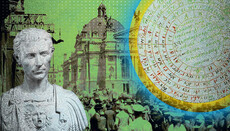
Why Lviv residents once defended “Muscovite” Christmas
15 January 13:55






